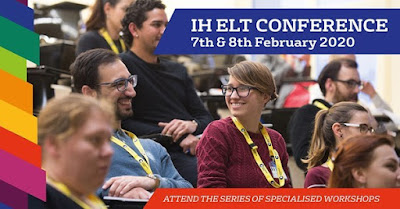Sarah Mercer: Opening Plenary Five design principles for engaging classrooms
IH ELT Conference 7-8th Feb, 2020
Sarah Mercer: Opening Plenary
Five design principles for engaging classrooms
 |
| Sarah Mercer: Opening Plenary at the IH ELT Conference |
Summary by Roxanne Rowles, EIM teacher
Engaged learners are the ideal of every teacher. We want our learners to be focused mentally, emotionally and behaviourally on the task at hand learning the language effectively. Yet, every teacher knows how difficult it is to capture learners’ attention and keep them engaged in language learning in the face of a multitude of other distractions.
In this talk, we reflect on the topic of learner engagement in ELT. We consider what some of the foundations of engagement are and how to engender a climate conducive to engaging learners. The main focus will be on a series of design principles that teachers can work with to set the foundations for learner engagement and then create tasks that trigger and maintain learners’ engagement.
I´ll give you an outline of her talk, including some comments from me
Sarah started by addressing the problem of learner engagement, ie bored students:
She said there are 2 types: Gorillas and Goldfish ( from the over-focused - see the 'Gorilla experiment' to the Goldfish - lack of attention) but I´d say there was greater variety of fauna in our classrooms: Miss Mouse, Bambi Big-Eyes, Sleepy Bear etc. Please add more!
She analysed the problem of engaging students into 3 types:
· Affective (want to)
· Cognitive (mentally engaged)
· Behavioral (actively engaged)
How do you know if a student is engaged? She asked. “When they ask questions”
(also: when they´re not slumped on their desks. Wake up, Sleepy Bear)
She warned against “fake compliance”, when students merely acquiesce to do your tasks, to be nice
(which is nice! Well, better than groaning and refusing to do it)
Key points: Growth mindset and Self-Efficacy.
She promotes the idea of breaking certain mindsets students have about their learning capacities.
I really agree. I think we´ve all heard the usual suspects . “I´m too old” ; “ I did French at school”; “ TV programmes are dubbed into Spanish” “You need a special gift to learn languages”
· Make mistakes welcome
· Promote the power of “yet” as in “ I can´t do it yet”
And suggested teaching this quote:
I like that.
 |
| Credit: Sarah Mercer, 7/2/20 |
- Make the learning process visible
(especially important at Advanced levels where it isn´t so obvious)
· Find the strengths of every learner
While I think this is good advice, it would have been nice to have had some ideas about how you go about this. Maybe you have some?
A really important point was: - Make sure learners see that learning matters to you
She calls that “ pedagogical caring” but that sounds a bit medical to me. True though: the best teachers are the ones who are engaged themselves, maybe even passionate. Maybe even on Saturday morning :)
Teach them to be good communicators: we have 2 ears and 1 mouth
How to listen and respond to each other, and give shyer students the space to express themselves.
(especially important at Advanced levels where it isn´t so obvious)
· Find the strengths of every learner
While I think this is good advice, it would have been nice to have had some ideas about how you go about this. Maybe you have some?
A really important point was: - Make sure learners see that learning matters to you
She calls that “ pedagogical caring” but that sounds a bit medical to me. True though: the best teachers are the ones who are engaged themselves, maybe even passionate. Maybe even on Saturday morning :)
Teach them to be good communicators: we have 2 ears and 1 mouth
How to listen and respond to each other, and give shyer students the space to express themselves.
 |
| Credit; Sarah Mercer 7/2/20 |
She stressed the importance of creating an atmosphere of trust in the classroom, by using “self-disclosure” activities (anecdotes from their lives, icebreakers throughout the course – because ice reforms!)
- To encourage good group dynamics she suggested occasionally mixing up the “set partners”
- Think of teachers as ‘designers of learning experiences’!
- And of course: zero tolerance for what she calls “uncollegial attitudes/behaviour)
(anyone who’s racist/homophobic in my class will immediately find out that is not acceptable)
Encourage them to
- Question each other
- Extend your wait time (ie don´t jump in too soon with the answer, corrections)
- Do task-based classes with problems to solve, projects to work on outside the class etc
Finally, she said
- Make them curious (use prediction exercises)
- Challenge them (don´t over-simplify)
- Use elements of surprise eg they make up the situation/ roles in a role-play, move around the class, invite ‘guests’, scavenger hunts / web searches, ‘flip’ the classroom, gradually reveal the tòpic (learners have to work it out from the clues).
Final comments from me:
The talk was very dense – loads of “Principles”, some useful tips, fewer actual practical ideas. But I like that, and Sarah is a great speaker. It´s a pleasure to be taught, for a change. I think issues of classroom management are often neglected in favour of “practical ideas for the classroom” type stuff.
Some of the above will be already familiar to you ,which is often the case in these talks, but it´s validating to hear that what you´re doing in the class is right on, and even has impressive names like “pedagogical caring”
Roxanne Rowles
·







Comments
Post a Comment